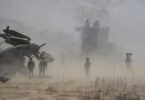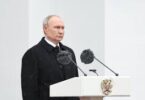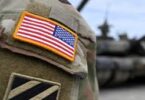WASHINGTON DC (Agencies): Joint Chiefs of Staff Chairman Gen. Mark Milley on Wednesday said there is “a real possibility” that al Qaeda or ISIS could reconstitute in Afghanistan as soon as early spring 2022.
Milley said the terrorist threat from Afghanistan is currently less than it was on 9/11, but that “the conditions could be set for a reconstitution of al Qaeda and/or ISIS.”
“It’s a real possibility in the not too distant future, six, 12, 18, 24, 36 months, that kind of timeframe, for reconstitution of al Qaeda or ISIS,” he told lawmakers at a House Armed Services Committee hearing.
Secretary of Defense Lloyd Austin, who testified alongside Milley, agreed with the comments, saying “there is clearly a possibility” for the groups to build back up with U.S. forces out of the country.
“Al Qaeda has been degraded over time. Now, terrorist organizations seek ungoverned spaces so that they can train and equip and thrive and, and so, there is clearly a possibility that that can happen here, going forward,” he said. “Our goal is to maintain a laser-like focus on this so that it doesn’t happen.”
The Trump administration in February 2020 signed a deal with the Taliban that agreed the United States would withdraw all its forces from Afghanistan in exchange for the promise the Islamic extremist group would not allow terrorist organizations to use the country as a launchpad for attacks.
But Pentagon officials are skeptical the Taliban will stand by this agreement. Austin a day prior told the Senate Armed Service Committee it is “not preordained” the U.S. military will have to return to Afghanistan in the near future, but he recognized that terrorists will “migrate towards ungoverned spaces.” He repeated this assertion before House lawmakers. “While I won’t rule anything out, I would just say it’s not preordained that we will go back or have to go back into Afghanistan again. But if we do, the military will provide good credible options to be able to do that and to be effective.”
Gen. Mark Milley further said that he would never tip off an enemy to any “surprise” U.S. attack plans as he defended himself from Republican criticism over calls he made to his Chinese counterpart during the Trump administration. Milley acknowledged that he told Gen. Li Zuocheng of China “I’ll probably give you a call” before the U.S. launched an attack against China, but he said the comment was part of a broader effort to tamp down Chinese fears about an imminent U.S. attack on orders of then-Defense Secretary Mark Esper.
“I’m not going to tip off the enemy about what the United States is going to do in an actual plan. What I’m trying to do is persuade an adversary that is heavily armed that was clearly and unambiguously according to intelligence reports very nervous about our behavior and what was happening inside this country and they were concerned that we President Trump was going to launch an attack. He was not going to launch an attack,” Milley told the House Armed Services Committee during testimony Wednesday.
“At the direction of the secretary of defense, I engaged the Chinese in order to persuade them to do that. I would never tip off any enemy to any kind of surprise thing that we were going to do. That is a different context than that conversation,” Milley added. Earlier during Wednesday’s hearing, Rep. Vicki Hartzler (R-Mo.) asked Milley if reports were true that he told Li he would give him a call before a U.S. attack in a call last October. The calls between Milley and Li, which took place on Oct. 30 and Jan. 8, were recently revealed in the book “Peril.”
“As part of that conversation, I said, ‘Gen Li, there’s not going to be a war, there’s not going to be attacks between great powers,’” Milley answered, describing his Oct. 30 call with Li. “’And if there was, the tensions would build up, there would be calls going back and forth from all kinds of senior officials.’ I said, ‘Hell, Gen. Li, I’ll probably give you a call, but we’re not going to attack you. Trust me. We’re not going to attack you.’”
“These are two great powers and I’m doing my best to transmit the president’s intent, president trump’s intent, to ensure that the American people are protected from an incident that could escalate,” Milley added.
Hartzler responded by telling Milley she believes he should resign.
“I understand your intent. I think you articulating that, that you would tell him, you would give him a call, I think is worthy of your resignation,” Hartzler said. “I just think that is against our country that you would give our No.1 adversary that information and tell him that.”
Milley, who has defended his calls to Li over the course of two days of testimony on Capitol Hill, also endured scrutiny from Rep. Mike Turner (R-Ohio), who criticized Milley for not sharing with Congress intelligence showing China was worried about a U.S. attack. Milley said that intelligence caused him to make the calls to the Chinese to deescalate the situation on orders from Esper. “With indignation in front of the House and the Senate, you have commented on the statements in the press concerning your phone conversation with your counterpart, General Li, in China. Let’s be clear, to give you some help with the indignation, those comments were in the press because that’s where you put them,” Turner said.
“You chose to talk to reporters instead of us and that is of great concern. No one in Congress knew that one of two of the major nuclear powers thought that they were perhaps being threatened for attacks,” he added. Both Milley and Secretary of Defense Lloyd Austin corrected Turner after the Republican lawmaker suggested that Milley did not elevate the intelligence to the Cabinet level.
“With respect to the intelligence, I have it right here, I’ll be happy to share it with you. I guarantee that that intelligence was disseminated in the president’s PDB, the vice president, the DNI, director of CIA, the secretary of defense, the assistant to the president for national security affairs, and others,” Milley said.
“That was significant and there was a lot of it. It wasn’t just a singular report.” Milley added. “I’d be happy to share it with you and go over it line by line.” Milley said the intelligence was concerning enough for Esper to direct him to contact Li.
“This was all done with oversight,” Milley said.
Turner asked Milley to provide the relevant intelligence to Congress and a transcript of the call with Li and suggested he declassify the intelligence that prompted the call. Turner also asked for readouts or memos related to the calls.
During a hearing on Tuesday, Sen. Tom Cotton (R-Ark.) asked Milley for a list of U.S. officials who joined him on the calls with Li and a list of similar calls made to military counterparts from other nations between September 2020 and Jan. 20. Cotton also sought readouts of the calls circulated in the Pentagon.
At the outset of Wednesday’s hearing, Milley told lawmakers he briefed senators “in detail” on the intelligence that prompted the calls in a classified session.






